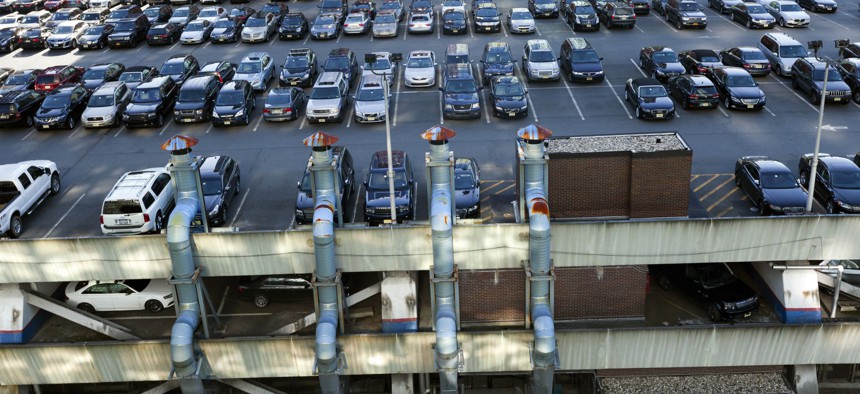Connecting state and local government leaders
With so many parking lots currently underutilized and an era of autonomous cars emerging, the return on investment may not be worth it.
Over the years, municipal governments and other local jurisdictions in the United States have spent billions and billions of dollars to accommodate parked automobiles. A parking garage or surface lot is usually a required element for any sort of development, whether it’s a large public investment like a convention center or stadium or a private one like an apartment building or retail complex.
Providing parking isn’t cheap and can increase the cost of construction. But trying to plan anything without parking—or even reduced parking minimums—can boil the collective blood of NIMBY groups and other local stakeholders, even when there are good public transit or other alternatives available.
“Minimum parking standards are the fertility drugs for cars,” Donald Shoup, an urban planning professor at the University of California-Los Angeles, wrote in The High Cost of Free Parking.
Parking is a sacred local commodity, even when it might not need to be as sacred as some think it needs to be—in many communities, there’s actually an abundance of unused parking.
Many of the discussions regarding public and private parking investments have been focused on the impacts of the required infrastructure on the urban fabric of cities. Soul-crushing surface lots and imposing concrete garages that might only be half full don’t necessarily encourage walkable communities and an active street life.
The need for on-street parking can often trump plans for expanded bicycle and transit infrastructure for increased mobility options, even when planners want to accommodate all users.
Parking strategies in some progressive cities, like Boulder, Colorado, for instance, are structured around environmental sustainability goals and other principles important to the community. In other places, parking garages are a central component of downtown economic development, like in Scranton, Pennsylvania.
Beyond those debates over urbanism, there are also important issues for municipal leaders to consider when it comes to matters of dollars and cents and the return on investment with parking.
A study of six cities released in 2014 by researchers at the University of Connecticut found that cities that invested in copious amounts of parking missed out on other revenue-generating activity.
As Bloomberg Businessweek reported at the time:
Parking-centric cities also sacrifice income. In all six cities studied by UConn’s researchers, land devoted to buildings provides at least 88 percent of tax revenue and sometimes as much as 97 percent; parking contributes very little. In other words, cities that turn themselves into car lots relinquish tax money in the bargain.
When pursuing a new garage or lot, figuring out ways to finance construction of a parking facility can be especially challenging.

In Rhode Island, where state lawmakers last week approved legislation that will help speed the construction a $45 million parking garage next to a judicial complex in Providence, some legislators opposing the plan felt that the proposal, which uses taxable bonds instead of tax-exempt bonds, is risky.
"I can guarantee there will not be enough cars in the early years," said state Rep. Patricia Morgan, according to The Providence Journal. "This puts state taxpayers in jeopardy of paying the majority of these bonds." With total bond payments, the cost of the parking garage will be $88.1 million over the course of 25 years.
Sometimes, financing for parking garages works out just fine.
In other cases, it doesn’t go exactly to plan.
In New York City, parking garages and surface lots adjacent to Yankee Stadium that were financed through municipal bonds are showing some signs of financial trouble. Fewer than 10 percent of baseball fans heading to Yankee Stadium utilize the 8,700 parking spaces in the nearby lots and garages, Bloomberg News reported on Thursday. Net losses on those parking facilities grew to $31.5 million.
In Scranton, the financing of downtown parking garages has been a local hot potato over the years. The Times-Tribune wrote this weekend:
In May 2012, the city was expected to pay $1 million toward a $1.2 million parking authority bond payment due June 1.
City Council, led by Councilwoman Janet Evans, blocked the payment, even though the city had promised to make payments if the authority couldn’t. Though the council approved the payment two weeks later, the default forced the authority into receivership.
Parking authority officials said garage revenues simply weren’t enough to pay the bonds without the city’s help.
A Lackawanna County judge appointed former County Commissioner Mike Washo as the receiver to manage the authority’s five garages so bondholders would consistently get paid.
When it comes to the best long-term use of municipal resources, it’s important to look ahead when it comes to technologies disrupting traditional models of transportation and how those could impact financing for parking, too.
With the anticipated introduction of autonomous vehicles, cities simply won’t need as many parking spaces in the decades to come. Among younger generations, there are also ongoing shifts in attitudes away from car ownership and toward more shared options when it comes to mobility, including ridebooking and car-sharing services.
But while the need for parking facilities isn’t going away immediately, the impacts of autonomous vehicles will certainly be felt in the coming years. And it’s not that far away.
“Ten to fifteen years from now the need for a garage as a building type will be eliminated,” Amy Korte, the principal designer at a Boston-based architectural firm, told Boston.com in an interview about the impacts of driverless cars on design.
That puts professional planners and public officials in a bit of pickle when it comes to their local parking strategies. While the expectation of copious amounts of available parking will remain in the short term, there are important questions about the long-term investments in parking as so many parking lots are currently underutilized.
In the Seattle area, the massive Sound Transit 3 expansion proposal that is set to go before voters in the fall includes a lot of parking at planned transit facilities. A draft proposal, according to Seattle Transit Blog, factors in $661 million in spending for new parking facilities—9,700 new spaces—or $80,000 per space.
Will there be a need for all that parking a generation from now? Time will tell.
While many municipal leaders need to consider short-term needs for accommodating cars, they also need to consider the long-term sustainability of those often expensive investments.
Michael Grass is Executive Editor of Government Executive’s Route Fifty and is based in Seattle.

NEXT STORY: Route Fifty Roadmap: An Iconic Piece of Infrastructure for the Zenith City




